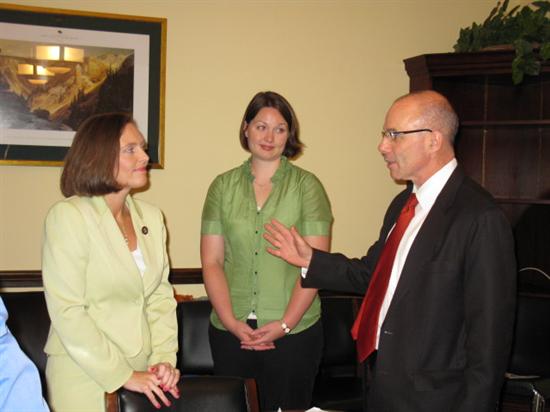Working on the most significant health care reform in a generation, Congresswoman Kathy Castor today discussed one of the major issues facing Florida: a shortage of physician residents. The Resident Physician Shortage Reduction Act will increase the number of physician residency training positions in Tampa Bay area hospitals and in other communities facing resident shortages. Castor is working to include these measures in the overall health care reform package.
Castor said Republican and Democratic Florida delegation members of Congress agree on the need to increase the number of medical residents in the state.
Florida ranks 44th in the ratio of resident physicians per 100,000 people.
“One of the critical problems we have is we don’t have the incentives in place to encourage medical students to choose primary care, and it’s exacerbated by not having enough primary care resident slots,” Castor said. “Our patients suffer and our state suffers.”
A 1997 federal law capped the number of Medicare-supported medical residents for hospitals and hasn’t accounted for growth in states such as Florida. The Resident Physician Shortage Reduction Act would create approximately 15,000 additional residency positions nationwide.
Dr. Stephen Klasko, dean of the University of South Florida’s College of Medicine, joined Castor today in talking about how the legislation will improve health care.
“Primary care access and residency slots will become the major obstacle to health care reform in Florida if we do not address it in the next three to four years because all the newly insured patients will have nowhere to go for their care,” Klasko said.
In 2009, for the first time, Florida graduated more doctors than can be retained in the state for their training. Having more residents will improve access to health care because they will serve in our hospitals, community health centers and clinics. For many Floridians and Americans, their only access to a primary care doctor is through a resident physician.
On Wednesday, Castor also met with Suki Conrad, a University of South Florida College of Medicine student and Florida native. Conrad wants to stay in Florida to complete her medical residency but is concerned about the few slots available. Passage of the bill, Castor said, would mean young doctors, such as Conrad, would be able to continue their medical training in Florida.
Ron Hytoff, president and chief executive of Tampa General Hospital, supports Castor’s work on the bill.
"We support this effort because we know how great the need is for more physicians," Hytoff said. “Having more residency slots will greatly improve the supply of physicians who practice in Florida."
Added Castor: “Members of the Florida delegation, Republican and Democrat alike, agree we must fix this problem. Increasing the number of resident slots in our state will improve health care for all.”


